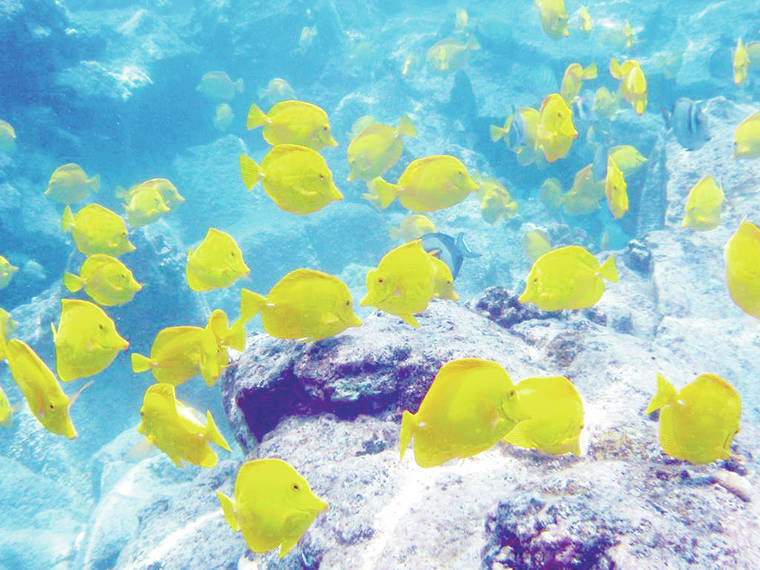HONOLULU — The state’s Environmental Council has upheld the state Board of Land and Natural Resources’ decision to maintain the ban on collecting fish for the aquarium-pet trade off the west coast of Hawai‘i Island, and to reject an environmental impact statement aimed at restarting the destructive practice.
The council’s decision was announced Friday.
It effectively leaves intact a moratorium on commercial aquarium collection along the Kona Coast, and vindicated reef advocates, many of whom have been urging more state scrutiny of the trade for decades.
“This is a huge win for me and my family and for our way of life,” said Miloli‘i fisherman Wilfred “Willie” Kaupiko, who has been fighting for over 30 years to protect West Hawai‘i reefs from the damaging effects of the aquarium trade.
“We are glad that the decision to reject the trade’s EIS will be upheld, and we will continue to carry on what we have fought to protect all these years.”
The land board’s May 22 decision was a major milestone in a legal battle that started in 2012, when Kaupiko and his son Ka‘imi joined forces with Center for Biological Diversity, Rene Umberger, Mike Nakachi and others to challenge the state’s failure to examine the aquarium-pet-trade’s impacts on ocean health.
Represented by Earthjustice, the group secured a decisive win in 2017 when the Hawai‘i Supreme Court ruled that the state could not issue further commercial aquarium permits until the trade’s environmental impacts were adequately reviewed under the Hawai‘i Environmental Policy Act.
After a three-year review process, the board unanimously rejected the EIS because it failed to satisfy HEPA’s environmental-review requirements.
The Pet Industry Joint Advisory Council, the Virginia-based pet-trade association that orchestrated preparation of the review documents, appealed the board’s decision to the Environmental Council.
This was the first time since HEPA was enacted more than 40 years ago that the council, which is responsible for determining whether government agencies have correctly applied HEPA, has presided over such an appeal.
“The council’s historic decision to affirm the land board reinforces that Hawai‘i’s bedrock environmental review law is not merely a paper exercise,” said Earthjustice attorney Kylie Wager Cruz.
“It’s about engaging with communities, providing an honest assessment of impacts, and taking steps to minimize harm. The industry simply didn’t do that, and now two state agencies have agreed.”
The board had concluded that the EIS failed to paint a true picture of the environmental harms of commercial aquarium collection.
Board members had noted a troubling lack of information about the ecological effects of removing fish in mass quantities from an already-fragile reef ecosystem, and a failure to seriously consider the cultural impacts of the trade, among other flaws.
“The industry used faulty data and failed to consider cumulative impacts to the environment, including how the effects of climate change interact with the severe losses of herbivore abundance to this wildlife trade,” said Umberger, executive director of For the Fishes, a reef wildlife advocacy group.
“Thankfully, the council agreed with the land board and did the right thing under the law.”
“This is good news. Hawai‘i’s coral reefs are already in trouble from climate change, and we can’t let the aquarium industry compound that damage,” said Maxx Phillips, Hawai‘i director at the Center for Biological Diversity.
“Both the board and the council have reinforced Hawai‘i’s fundamental duty to protect our coral reefs and the biodiversity they support.”
“There is only one Hawai‘i,” said Mike Nakachi, a Native Hawaiian cultural practitioner from Kailua-Kona.
”We humans have done so much to harm and misuse this home we are blessed with. I’m grateful to the council for doing the right thing, but we’re not pau,” he said.
”We need to do more to malama ‘aina. We need to make things momona (abundant) again,” said Nakachi.
“The board’s decision was such a blessing for our family and for our West Hawai‘i community,” said Miloli‘i fisherman Ka‘imi Kaupiko. “We are so thankful that, today, that decision stands.”
“Extracting Hawai‘i’s reef wildlife for the private pet industry is fundamentally at odds with Hawaiian culture, traditions and religious practices,” said Kealoha Pisciotta, a Native Hawaiian cultural practitioner and founder of Kai Palaoa.
“Marine life, which depend on a healthy and abundant reef ecosystem, are not only sacred and revered, but also aumakua (family gods) to many people.”
For decades, commercial aquarium collectors in Hawai‘i routinely extracted hundreds of thousands of endemic and indigenous Hawaiian reef fish and invertebrates a year, packaging the live fish in plastic bags and exporting them via air freight to aquarium hobbyists across the country.
Although affirming the board’s decision effectively extends the moratorium on aquarium collection in West Hawai‘i, the state has continued to allow the industry to extract an unlimited number of fish annually in East Hawai‘i and elsewhere throughout the state.
This ongoing illegal collection has prompted reef advocates to file a parallel lawsuit, which is pending before the Hawai‘i Environmental Court.



An exotic fish aquarium is a luxury that no one needs.
Examples of Hawaiian fauna and flora belong in public aquariums, not in private tanks.
Hurrah for the Environmental Council!
Why is it okay to eat fish off the reef and not catch them for pets?
I don’t see a difference.